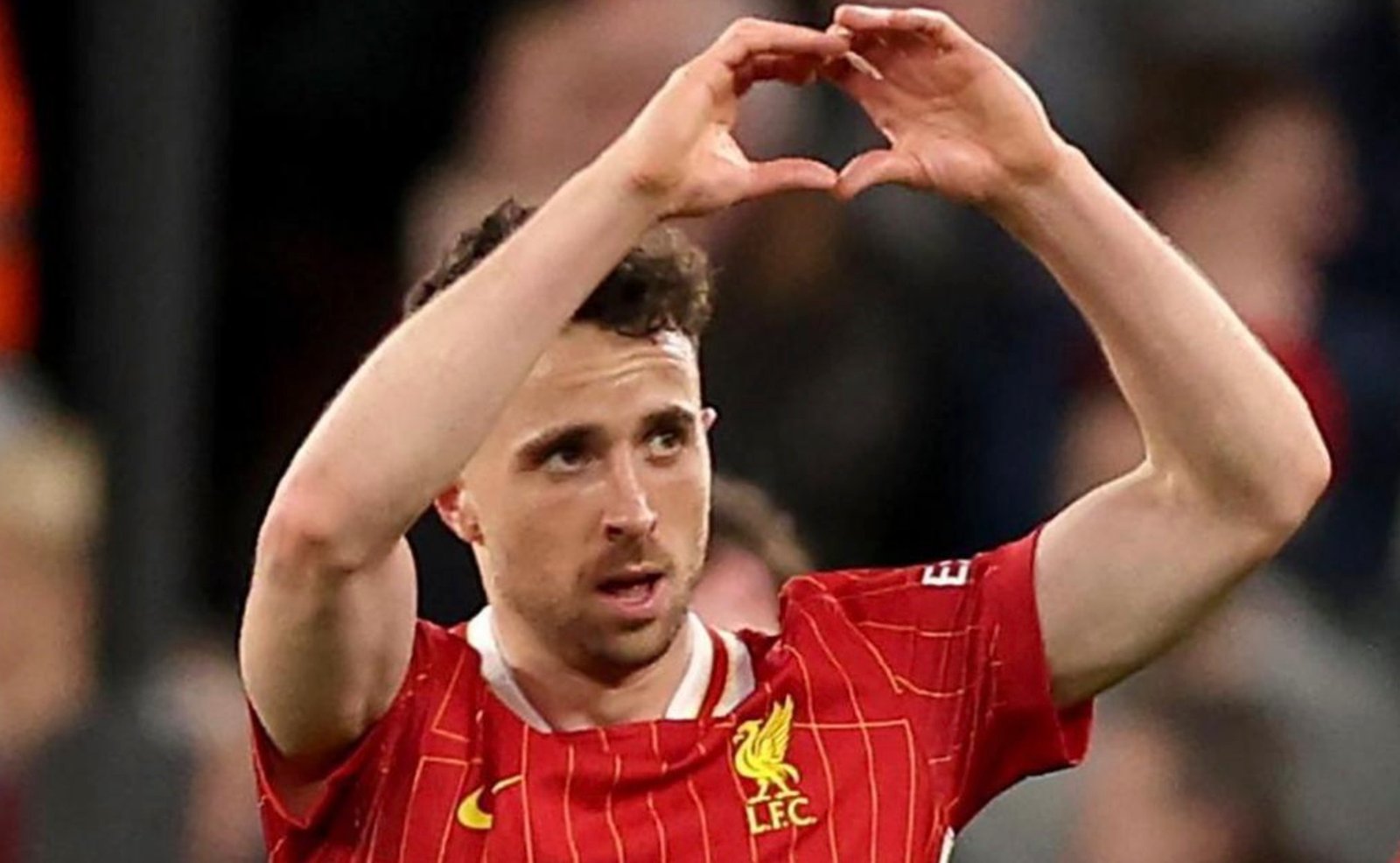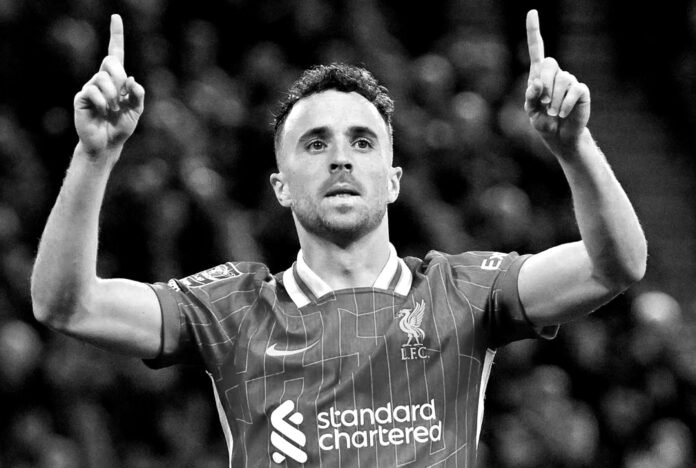It was around 5am EST and I was sitting with a few colleagues at a TV station where I freelance. In those early morning hours we mostly chit-chat about life or sports while others catch a quick nap before the broadcast ramps up into action. Out of nowhere, I saw a notification come across a newswire: “Two Dead in Spain, Car Accident. Believed to be the footballer Diogo Jota and his brother.” The message hit me like a punch right to the gut.
This being 2025 and the internet being what it has become with AI and misinformation, I was at first extremely skeptical. I asked one of my co-workers to monitor local Spanish sports and news websites for any updates and for a few brief minutes nothing came up. In that short agonising time, I began to think maybe there had been a mistake. And then, the headline appeared everywhere. The worst news had been confirmed and was now being reported everywhere around the world now: Diogo and his brother Andre had perished.
Working in news has a flattening effect on reporting tragedy. The cycles of life fly by day after day and more often than not, the worst stories are what makes headlines first. Death, destruction, terrible politics, worse leaders, global tragedies, the daily piling up of it can lead one to put on a sort of invisible armour of detachment to just get through all of it and go through another day. Yet for some reason, this cut right through me. Not just because I support Liverpool and have had the pleasure of seeing Diogo play live at Anfield, but something deeper really surged into me in that moment and the days that followed. It was the realisation once again, the lesson we all are told and try to hold on to but rarely keep present: Things can change in an instant and you must never take any of it for granted.
I recently had a major health scare that ended up with a stint in the hospital. At the time I wasn’t fully aware of how dire my situation was and thankfully I am back on the road to recovery now. However, in that moment and immediate aftermath I was struck by how quickly my whole world changed. One day I felt fine, the next was too weak to walk up a flight of stairs. What followed were a blur of tests, doctors and endless worries before finding out that things would be alright. All I wanted was to return to the life I had just been leading without thinking or worrying much at all about it. The sort of nonchalance most of us take to our daily lives and routines. But it can change in the blink of an eye.
Watching and reading all the messages from Diogo and Andre’s friends, colleagues and family broke my heart because of how sudden and unexpected it was. One minute they were two brothers driving together through Spain in the night and then, in an instant, were gone, leaving a void no one can ever replace or understand. In the last two months Diogo had won the Premier League, then the Nations League with Portugal and most importantly married the love of his life, Rute Cardoso with whom they share three beautiful kids. Less than two weeks later, his funeral was in that very same church where they’d been married in the most painful twist of fate I’ve ever heard of.
As a player, Diogo was exactly the sort of figure Liverpool loves. He came up from humble beginnings, hard working and determined, making his way slowly but surely to some of the top teams in the world. One of the running jokes of his career at Liverpool was that, despite not being among the giants of the squad, he always seemed to get a remarkable amount of headed goals. This spoke to his grit and willingness to throw himself right into the fray. He had a knack for clutch goals, including what impossibly now will prove to be his final one: the winner against Everton which put the team right on the brink of the title. Jota The Slotter had struck again. Ask any Liverpool fan about Jota and they would all say the same thing about him: He was relentless and had a poacher’s instincts and all they ever wanted was for him to remain healthy enough to always be an option because when he played, he delivered.

It’s clear what he meant to his teammates and the football world at large. Everyone wrote or paid their respects in their own ways. Many were brought to tears on the pitch as moments of silence occurred around the world. His teammates have written moving tributes to the friend and man he was and flew from all over the world to be by his and Andre’s family’s side for the hardest moment of their lives. Theirs is a pain that cannot and must not be diminished and their privacy has to be protected at all costs. As football fans we grieve for the players, but they all are losing the real men inside the jersey. The husband, father, sons, words that hurt just to type because they speak to the many roles that have all been taken far too soon.
Liverpool as a club and city are no strangers unfortunately to grave tragedy and senseless loss of life. It is the resiliency of its people that they come together and lift each other up even when it seems impossible to keep moving forward. As we all try to find a way to return to our daily routine and block out any notion that it can all be gone in an instant. The loss of these two young men is the shock to the system to try and never become too numb or complacent. Yes we need to sometimes do what we have to do to cope or get through the rough moments but we must also make sure our nerves remain alive and right below the surface. The whole point of this life is to experience it, to feel the thrill of being alive.
As Jurgen would often say, football is the most important least important thing there is and the wisdom there is profound because it gets at the very core of life itself. If we allow ourselves to not find joy or pleasure we risk becoming dull and jaded and to fade away into depression. To enjoy something helps put things into perspective and to miss things when they fail or worse, are taken away.
On the Friday morning broadcast of the same show I work on, news of Diogo and Andre’s passing had made enough of a mark that it was included in the program which rarely focuses on football, especially non-American stories. As the anchor began to read the script he called Diogo- “Diego Jota” and I gently but firmly reminded him it was “Diogo” and he’s a lad from Portugal who was better than Figo.
The reference went over his head but once the show ended I showed several of my colleagues the tributes that had come through which brought many of them to tears. People who had never heard of the brothers or Liverpool at all but were moved nonetheless because of the sheer humanity it showed.
You’ll Never Walk Alone isn’t just a motto, it is the very essence of being alive and, at times like this, the only way forward. The next few days and weeks will hurt for everyone involved. There is no going back, no way to return to better times. The pain will be deep and hit at unexpected moments. All we can do is be there for one another and keep showing up. Keep trying to stay engaged and remember how precious the time we have is.


